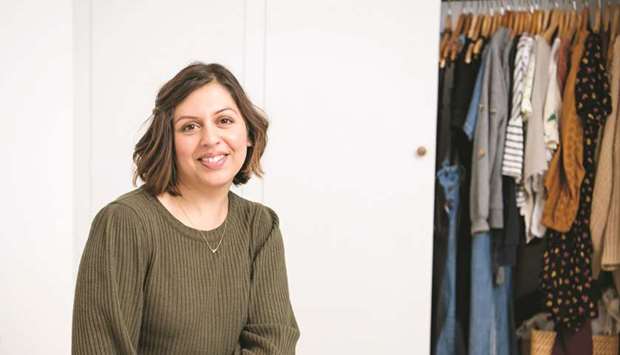I was brought up with certain religious rules about what I could and could not wear – no bare arms, no bare legs – and, as a teenager, I longed for the sort of outfits I wasn’t allowed. Once, on a shopping trip to Birmingham with school friends, I tried on halter necks, skirts and flimsy summer dresses in the Topshop changing rooms, just to see how they looked. I remember the wild excitement, gazing at a reflection that didn’t seem like me. I suppose this was the first time I realised that clothes meant I could pretend to be someone else.
At university, my friends nicknamed me Fashion, because I was always buying new clothes. I had a weekend job at a bookshop and saved my meagre wages to purchase entire outfits: shoes, tops and bottoms, all chosen to be carefully put together in a way that I hoped looked effortless. I loved the way it felt when I received a compliment about my clothes.
It was when I was studying for masters in Paris that my obsession started to get out of hand. I felt out of depth on my politics course. My hours were long and intense. Making friends as a postgraduate was hard. I was lonely. More than once, I felt like giving up the course.
My university was tucked down an elegant side street surrounded by boutiques filled with the sort of clothes that took my breath away. In these stores, the staff would complement me on my taste and all my anxieties would vanish. I slipped purchases on my credit card, telling myself I would deal with it later. I reasoned that the money that most people spent on socialising, I could spend on clothes.
My father fell gravely ill and I returned to England, worried, and scared, with a suitcase of beautiful clothes. When he died, I felt deeply alone and out of place, at this point in a new job and new city, trying to process the grief that I carried around inside me all day. Somehow, buying clothes took my pain away. I shopped online in my lunch break or on the way home. I didn’t particularly feel a thrill from the purchases. I just did it because it was something to do. My heart was heavy, but being able to mindlessly pick out a pretty top each morning meant that in that moment, I didn’t have to think about how lonely I felt.
I accumulated so many clothes I had to order a spare wardrobe to hold everything. I was working in personal finance at the time and once wrote a piece about shopping addiction, acutely aware of the irony. “You try and substitute what you need to survive in the world with material goods,” a psychologist I interviewed told me. I knew what he meant – not to mention the environmental impact of buying so many clothes – and yet kept doing it anyway. I was careful not to fall into debt (and in this way, convinced myself it was not an addiction after all), but the cost of my purchases crept up. A Malene Birger dress, a Marc Jacobs coat, a Missoni skirt, a Mulberry bag.
Eventually, I met someone who would become my fiancé and for the first time in a long time, I didn’t feel lonely. Life became brighter, lighter, and simpler. There was hope and possibility. I was to move in with him after our wedding, but there was one big problem, there definitely wouldn’t be enough room for all of my clothes.
As I emptied my wardrobe, trying to pack for life as a newlywed, I felt repulsed and embarrassed by it all. Seeing my clothes, some still with tags on, in a messy heap made me realise that none of it meant anything at all. All it reminded me of was my loneliness, how I had tried to hide it, and also, the recklessness with which I had spent so much money. I didn’t want to start the next chapter of my life weighed down by a reminder of this sadness, packaged up in pretty clothes.
So I invited friends over and let them pick whatever they wanted to keep. I sold the more expensive items to secondhand stores and donated the rest to charity. I kept around a tenth of my original wardrobe, none of it particularly fashionable at all.
Eight years on, I still love shopping but I’m far more considered when I buy things. The act of giving away so many clothes was a way for me to shed all the layers of personas I had been hiding underneath for so long. I came to see that I didn’t have to dress up to pretend to be somebody else. That I didn’t have to hide any more. I could just be me, and that was more than good enough. – The Guardian

